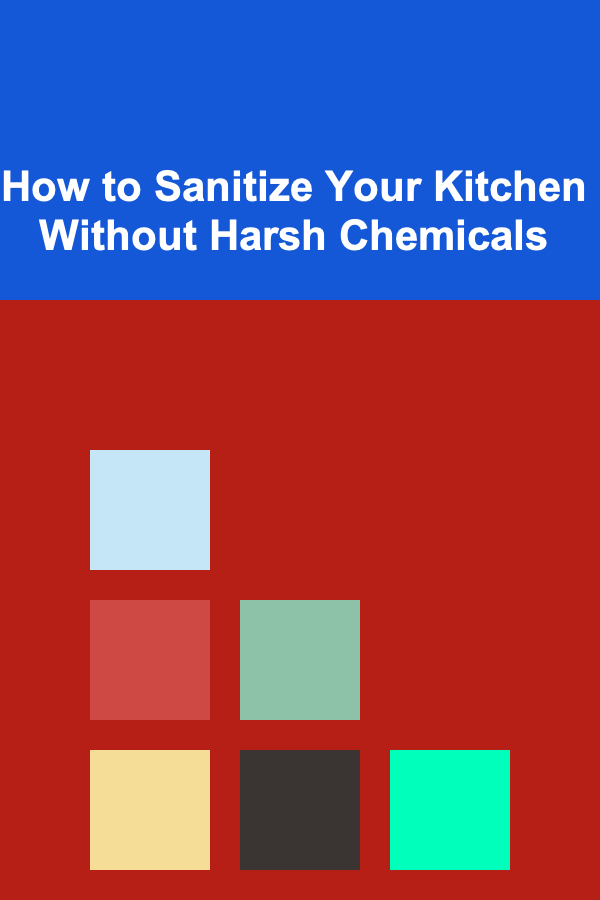
How to Sanitize Your Kitchen Without Harsh Chemicals
ebook include PDF & Audio bundle (Micro Guide)
$12.99$7.99
Limited Time Offer! Order within the next:

The kitchen is often regarded as the heart of the home, where meals are prepared, families gather, and memories are made. However, it is also a place where germs, bacteria, and other harmful pathogens can thrive, making it essential to maintain a clean and sanitized environment. Traditionally, harsh chemicals like bleach, ammonia, and disinfectants have been used to sanitize kitchens, but they can pose risks to both human health and the environment. Fortunately, there are natural, effective alternatives to these chemicals that can sanitize your kitchen without compromising your health or the planet.
This article will explore various methods and natural solutions for sanitizing your kitchen. From countertops to appliances, we will dive into effective and eco-friendly strategies for keeping your kitchen safe and hygienic using simple, non-toxic ingredients. Whether you're looking to reduce your exposure to chemicals or make your kitchen more sustainable, this guide will help you achieve a sparkling, sanitized kitchen without the use of harsh chemicals.
Why Choose Natural Alternatives to Harsh Chemicals?
Before we dive into specific cleaning methods, it's important to understand why avoiding harsh chemicals in the kitchen is beneficial.
1. Health Benefits
Many conventional cleaning products contain toxic chemicals that can have long-term health effects. For instance, exposure to bleach, ammonia, and other disinfectants can irritate the skin, eyes, and respiratory system. Furthermore, the ingestion of chemical residues can be harmful, especially if they come into contact with food preparation areas.
Using natural cleaners such as vinegar, baking soda, and essential oils reduces the risk of chemical exposure. These natural ingredients are gentle on the skin, non-toxic if ingested in small quantities, and do not produce harmful fumes.
2. Environmental Impact
Conventional cleaning products contribute to environmental pollution. The chemicals in these products often end up in waterways, harming aquatic life and contaminating ecosystems. In contrast, natural cleaning solutions are biodegradable, reducing their environmental footprint. By choosing non-toxic cleaners, you are contributing to a healthier planet and a cleaner environment.
3. Cost-Effective
Natural cleaning ingredients are often much more affordable than commercial cleaning products. Items like vinegar, baking soda, and lemon are inexpensive, and you can use them for a variety of cleaning tasks. By relying on natural cleaners, you can significantly cut down on your cleaning expenses.
Essential Natural Cleaning Ingredients
There are several key ingredients that form the foundation of natural cleaning solutions. These ingredients are versatile, effective, and safe for both your health and the environment.
1. Vinegar
Vinegar is a powerful natural cleaner that can be used to disinfect and deodorize surfaces. It has antibacterial and antifungal properties, making it an excellent choice for sanitizing countertops, sinks, and cutting boards. The acetic acid in vinegar helps break down grease, grime, and mineral deposits, leaving surfaces clean and sparkling.
2. Baking Soda
Baking soda is another essential cleaning ingredient. It works as an abrasive, making it ideal for scrubbing surfaces like countertops, stovetops, and sinks. Baking soda also helps neutralize odors, leaving your kitchen smelling fresh. Its ability to absorb moisture and odors makes it an excellent choice for sanitizing trash cans and refrigerators.
3. Lemon
Lemon is a natural disinfectant with antibacterial properties. The citric acid in lemon can help break down grease and remove stains from surfaces. It also has a refreshing scent, making it an excellent choice for deodorizing your kitchen. Lemon can be used in combination with baking soda for more powerful cleaning and scrubbing.
4. Castile Soap
Castile soap is a vegetable-based soap that is free of synthetic chemicals and fragrances. It is a gentle yet effective cleaner that can be used on countertops, dishes, and even floors. Castile soap is biodegradable and non-toxic, making it an eco-friendly choice for sanitizing your kitchen.
5. Essential Oils
Essential oils not only provide pleasant fragrances but also have natural antimicrobial properties. Oils such as tea tree oil, lavender, and eucalyptus can be used to sanitize surfaces and add a refreshing scent to your kitchen. Tea tree oil, in particular, is known for its antifungal and antibacterial properties, making it an excellent choice for sanitizing.
6. Hydrogen Peroxide
Hydrogen peroxide is a mild disinfectant that can be used to sanitize surfaces in your kitchen. It is particularly effective at killing bacteria and viruses. When using hydrogen peroxide, ensure that it is at a concentration of 3% for safe use. Hydrogen peroxide can be used to clean cutting boards, kitchen sponges, and sinks.
Step-by-Step Guide to Sanitizing Your Kitchen
Now that we've covered the essential ingredients for natural cleaning, let's walk through how to use them to sanitize different areas of your kitchen.
1. Countertops and Surfaces
Countertops are one of the most frequently used surfaces in the kitchen, and they are often exposed to raw food, spills, and crumbs. To sanitize your countertops:
Materials Needed:
- 1 cup of vinegar
- 1 cup of water
- 10 drops of tea tree essential oil
- Spray bottle
Instructions:
- Mix the vinegar, water, and essential oils in a spray bottle.
- Spray the solution onto your countertops, making sure to cover the entire surface.
- Let the solution sit for a few minutes to allow it to disinfect the surface.
- Wipe the countertops with a clean microfiber cloth or paper towel.
- For stubborn stains, sprinkle a small amount of baking soda onto the surface and scrub with a damp cloth.
This solution works well for granite, marble, quartz, and other non-porous surfaces. Be cautious when using vinegar on porous surfaces like granite, as prolonged exposure can cause damage.
2. Cutting Boards
Cutting boards, especially wooden ones, can harbor bacteria from raw meats and vegetables. To sanitize your cutting board naturally:
Materials Needed:
- 1 tablespoon of baking soda
- 1 tablespoon of vinegar
- Lemon juice
Instructions:
- Sprinkle baking soda over the surface of your cutting board.
- Add a few drops of vinegar or lemon juice to create a fizzing reaction.
- Scrub the surface with a sponge or scrub brush, paying extra attention to crevices and grooves.
- Rinse the cutting board thoroughly with warm water.
- Dry with a clean towel or let it air dry.
For wooden cutting boards, it's important to keep them dry to prevent warping. Regularly oil the board with food-safe mineral oil to keep it in good condition.
3. Stovetops
Stovetops are prone to grease buildup and food spills. To clean and sanitize your stovetop:
Materials Needed:
- Baking soda
- Water
- Vinegar
- Dish soap
Instructions:
- Sprinkle a thin layer of baking soda over the stovetop.
- Mix a solution of equal parts vinegar and water in a spray bottle.
- Spray the vinegar solution over the baking soda to create a fizzing effect.
- Let the mixture sit for 10-15 minutes to break down grease and grime.
- Scrub the stovetop with a sponge or non-abrasive scrub brush.
- Rinse with warm water and wipe with a clean cloth.
For tough stains or burned-on food, repeat the process and let the solution sit longer before scrubbing.
4. Sinks and Faucets
Sinks and faucets are constantly exposed to water, soap, and food particles, making them breeding grounds for bacteria. To sanitize your sink:
Materials Needed:
- Hydrogen peroxide (3%)
- Baking soda
- Dish soap
Instructions:
- Pour hydrogen peroxide into the sink and allow it to sit for 10 minutes.
- Sprinkle baking soda over the surface of the sink.
- Scrub the sink and faucet with a non-abrasive sponge or brush.
- Rinse thoroughly with warm water.
- Wipe dry with a microfiber cloth.
Hydrogen peroxide is particularly effective at sanitizing kitchen sinks, as it kills a wide range of bacteria and viruses. For a sparkling finish, buff the sink with a clean cloth.
5. Microwave
The microwave can quickly accumulate food splatters and odors. To clean and sanitize it:
Materials Needed:
- 1 cup of water
- 1 tablespoon of vinegar or lemon juice
Instructions:
- Mix the water and vinegar (or lemon juice) in a microwave-safe bowl.
- Microwave the mixture on high for 3-5 minutes, allowing the steam to loosen food particles.
- Carefully remove the bowl from the microwave.
- Wipe the interior with a damp cloth or sponge.
- For stubborn stains, sprinkle baking soda on a damp cloth and scrub.
6. Refrigerator
A clean refrigerator is essential for maintaining food safety. To sanitize your fridge:
Materials Needed:
- Baking soda
- Warm water
- Dish soap
- Essential oils (optional)
Instructions:
- Empty the refrigerator and remove all food items.
- Mix warm water with a few drops of dish soap.
- Wipe down all shelves, drawers, and surfaces with the soapy water.
- For deodorizing, sprinkle baking soda in the bottom of the fridge.
- Use a microfiber cloth to dry and polish the interior.
7. Trash Cans
Trash cans are often overlooked but can harbor bacteria and odors. To sanitize your trash can:
Materials Needed:
- Baking soda
- Vinegar
- Water
Instructions:
- Empty the trash can and rinse it with water.
- Sprinkle a layer of baking soda inside the can to absorb odors.
- Spray the inside of the can with a vinegar solution (1 part vinegar, 1 part water).
- Scrub the interior with a brush, focusing on corners.
- Rinse the can thoroughly and let it air dry.
Conclusion
Sanitizing your kitchen without harsh chemicals is not only possible but highly effective. By using natural ingredients like vinegar, baking soda, lemon, and essential oils, you can create powerful cleaning solutions that are safe for both your health and the environment. These simple, eco-friendly cleaning methods can be used throughout your kitchen, from countertops to appliances, ensuring that your kitchen remains sparkling clean and free from harmful pathogens.
By adopting these practices, you can reduce your reliance on toxic chemicals and create a safer, more sustainable kitchen for you and your family. So next time you need to sanitize your kitchen, reach for the natural cleaners already in your pantry and enjoy the peace of mind that comes with a chemical-free home.
Reading More From Our Other Websites
- [Tie-Dyeing Tip 101] Best Tie‑Dye Patterns for Beginner Knitters & Yarn Artists
- [Personal Investment 101] How to Invest in Commercial Real Estate for Passive Income
- [Hiking with Kids Tip 101] Nature's Playground: Must-Visit National Parks for Family Hikes
- [Personal Care Tips 101] How to Practice Forest Bathing for Mental Wellness
- [Home Pet Care 101] How to Keep Your Pet Safe During the Holiday Season
- [Personal Investment 101] How to Choose the Right Investment Account Based on Your Financial Goals
- [Organization Tip 101] How to Keep Your Sneakers Looking Fresh and Organized
- [Organization Tip 101] How to Choose Eco-Friendly Storage Options for Pet Supplies
- [Home Holiday Decoration 101] How to Incorporate Metallic Elements into Your Holiday Decor
- [Organization Tip 101] How to Maximize Space with Vertical Storage Solutions

How to Designate a Specific Area for Pet Grooming Supplies
Read More
How to Learn to Play Blues Harmonica
Read More
How to Set and Achieve Your Financial Goals in 5 Simple Steps
Read More
How To Create Fuller-Looking Lips Instantly
Read More
10 Tips for Creating Textured Woven Fabrics
Read More
10 Tips for Becoming a Data-Driven Product Manager
Read MoreOther Products

How to Designate a Specific Area for Pet Grooming Supplies
Read More
How to Learn to Play Blues Harmonica
Read More
How to Set and Achieve Your Financial Goals in 5 Simple Steps
Read More
How To Create Fuller-Looking Lips Instantly
Read More
10 Tips for Creating Textured Woven Fabrics
Read More